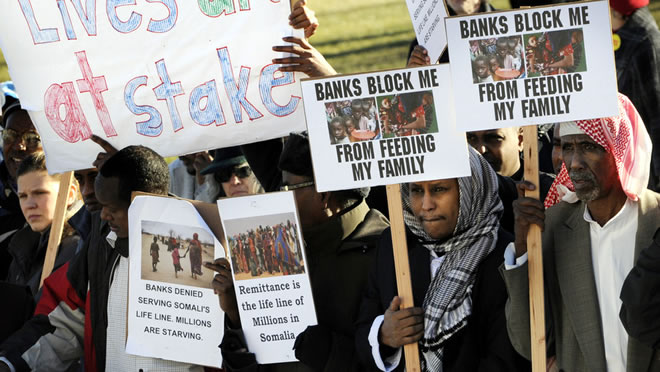
Somali Americans rally at the Minnesota State Capitol to protest the closure of money service businesses Friday, Jan. 6, 2012, in St. Paul, Minn. They are asking banks to restore relations with the companies wiring money to millions of Somali refugees in the Horn of Africa. (AP Photo)

By Katie Rucke
Thursday, March 06, 2014
In one case, an American citizen — born and raised in Minneapolis — had his bank account closed, along with his sister’s account. The client used the account he opened in 2002 for his dental practice.
He reportedly did not have any international transactions on his account, nor did he ever bounce a check or fail to keep a minimum balance. But he says that didn’t stop TCF from issuing a letter notifying him that the bank was “exercising its right under the terms of your account contract to discontinue our banking relationship.”
“A letter notified me that my account is closing, then after visiting and calling them I was notified by phone that TCF will not keep me as a customer even if I open a new account,” the former TCF customer told MintPress News.
Another Minneapolis resident says his TCF account was closed after a 12- to 15-year banking relationship. A doctor and practicing Muslim, the appellant says he learned his account was closed when he “received an unregistered/uncertified envelope at my doorstep that contained a check for the balance of my entire account with TCF bank and a letter stating that my account had been closed.”
According to the Council on American-Islamic Relations Minnesota chapter, America’s largest Muslim civil liberties and advocacy organization, the closure of bank accounts belonging to Minnesota Muslims of Somali, Middle Eastern and South Asian origin, largely occurred between 2012 and 2013.
CAIR-MN says it first got involved after it was reported in January 2013 that several Iranian students at the University of Minnesota had their accounts closed.
As the group’s Civil Rights Director Saly Abd Alla told MintPress, “None of these individuals have been charged with any crimes or engaged in any transaction that violates U.S. law. The only thing these individuals have in common, aside from TCF abruptly and without explanation closing their bank accounts, is that they have Muslim names.
“All of the clients are American citizens,” she added. “Some are converts to Islam, others were born into a Muslim family; they are various ages and professions; different ethnicities and races.”
Concerned that the accounts were closed not because these individuals had negative transactions or suspicious activity on their accounts, but solely because the individuals identified with the Islamic community, CAIR-MN wrote a letter to TCF Bank.
“As a civil rights organization, we are deeply disturbed by these allegations of discrimination and religious profiling of loyal TCF Bank customers,” the letter said. “We want to ensure that TCF Bank is not engaged in discrimination and is not targeting people who are Muslim or come from predominantly Muslim countries.”
Civil rights violation?
But it wasn’t just CAIR-MN that was concerned about the bank closures that the former TCF clients were not even able to contest. In February 2014, the director of the Minneapolis Department of Civil Rights filed a civil rights complaint on behalf of Muslim clients whose accounts were closed by TCF Bank without explanation.
In response to the accusations, Mark Goldman, senior vice president and director of corporate communications for TCF Financial Corporation, said, “TCF is disappointed the Minneapolis Department of Civil Rights has chosen to file an ambiguous claim that prevents the bank from responding more specifically to a serious allegation. We believe that the facts will show that this issue is about compliance with federal law and is in no way an issue of discrimination.”
Abd Alla said CAIR-MN approached TCF Bank before filing the complaint, hoping to resolve the issue, but says the bank has “denied any wrongdoing despite the evidence in the case.”
But Goldman stressed that “TCF is committed to providing quality banking services to all of its customers regardless of gender, race, religion or nationality,” as required by the Office of the Comptroller of the Currency, and said that the bank was taking the allegations seriously.
He added that TCF is not able to respond to the allegations made by the Minneapolis Department of Civil Rights “because the complaint does not specifically identify any of the individuals or the specific facts related to their claims.”
With that being said, Goldman explained, “TCF does not close a customer account unless it has a legitimate reason to do so.
“For example, TCF has obligations under federal laws that require the bank to obtain additional information about specific account transactions for a variety of reasons, including protecting against the use of funds for illegal activities. If a customer fails to provide required information, insufficiently responds to the request or provides information that does not comply with the law, TCF is compelled to close the account. There may also be other reasons under the applicable federal laws that would leave no alternative but for TCF to close an account.”
Because TCF isn’t aware of the identities of those who filed the claim, Goldman says he isn’t able to determine why their accounts were closed.
However, as the Star Tribune reported last year, the U.S. government has “a long list of rules and procedures governing transactions that involve Iran as part of its sanctions over the country’s alleged pursuit of a nuclear weapons program and state sponsorship of terrorism.”
The fact that these individuals are Palestinian-American, Syrian-American, Iraqi-American, Indian-American, Pakistani-American and Somali-American may mean that their bank accounts are watched more intensely than others, and there may have been stricter guidelines set in place regarding what the federal government viewed as appropriate transactions.
Talking to the Star Tribune after it was discovered several University of Minnesota students were issued letters, Professor William Beeman, a Middle East expert and Chair of the University of Minnesota’s anthropology department, said the bank’s explanation was “implausible,” and said the only irregularity that the bank may have seen is that the students were Iranian.
“The students have compared notes,” he said. “Many of the students have had no money transfers at all. They have not had their accounts overdrawn. Their banking record is spotless.”
Nationwide trend?
Though it’s not known how many denial-of-banking letters have been issued nationwide, according to CAIR’s Michigan office, several members of the Islamic community have had their accounts closed by Chase Bank, which is why Abd Alla says CAIR-MN is “collaborating with other CAIR chapters to bring a national complaint against TCF, Chase and other banks who have violated civil rights laws.”
In addition to the civil rights complaint and a director’s charge with the Minneapolis Department of Civil Rights, Abd Alla said CAIR-MN is considering filing a national complaint with the U.S. Department of Justice, and is working with Congressman Keith Ellison and other elected officials to push back against the unjust treatment of certain groups of people — in this case, Muslims and those of Arab descent.
“CAIR-MN is also increasing its efforts to educate the Muslim community on their civil rights and empowering them to report cases of discrimination,” she said.